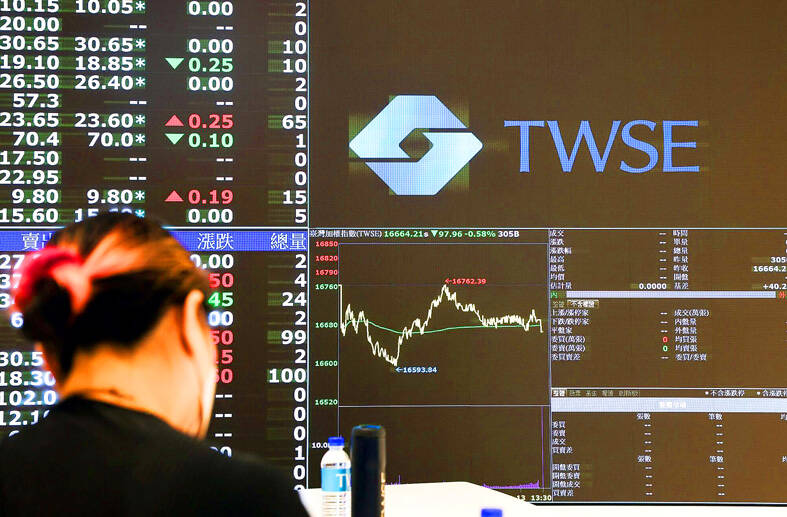Companies listed on the Taiwan Stock Exchange (TWSE) posted a year-on-year decline of more than 8 percent in combined sales last month as the transportation, steel, and oil, gas and electricity industries saw revenue move lower on weakening demand in the month, the exchange said on Friday.
Data compiled by the TWSE showed combined sales posted by 981 companies listed on the main board totaled NT$3.04 trillion (US$95.6 billion), down NT$269.7 billion or 8.14 percent from a year earlier.
Among the 981 listed companies, 382 registered an increase in sales, while 599 reported a decline in revenue, the data indicated.

Photo: Bloomberg
The transportation industry, which includes major container cargo shippers, generated NT$98.9 billion in aggregate sales, down 41.51 percent from a year earlier, the steepest decline among the major industries on the main board, at a time when high inflation worldwide affected global demand for cargo shipping.
In the oil, gas and electricity industry, which suffered the second-steepest fall in revenue, combined sales fell 28.61 percent from a year earlier to NT$57.9 billion.
The exchange said the downturn in the oil, gas and electricity industry largely reflected a decline in international crude oil prices in the month.
The steel industry felt the pinch resulting from a fall in product prices and saw sales fall 17.88 percent from a year earlier to NT$69.8 billion, the third-steepest decline, according to the exchange.
Bucking the downturn, the tourism, food and beverage industry benefited from eased border controls, posting NT$9.0 billion in sales, up 52.54 percent from a year earlier.
The building materials and construction industry came in second after registering a 25.55 percent increase in sales to NT$34.4 billion as many companies booked revenue from completed construction projects in the month, the exchange said.
The financial and insurance industry reported the third-highest growth in sales, rising 19.08 percent from a year earlier to NT$200.3 billion on the back of an increase in investment returns.
In the first seven months of this year, the 981 listed companies posted NT$20.37 trillion in sales, down 11.68 percent from a year earlier, with 335 reporting an increase and 646 registering a decline, the data showed.
The transportation industry suffered the steepest year-on-year decline of 42.76 percent in sales, which totaled NT $653.9 billion in the seven- month period, while the tourism, food and beverage industry reported the highest growth of 53.17 percent in revenue, which hit NT$55.6 billion, the exchange’s data showed.

Taiwan Semiconductor Manufacturing Co (TSMC, 台積電) would not produce its most advanced technologies in the US next year, Minister of Economic Affairs J.W. Kuo (郭智輝) said yesterday. Kuo made the comment during an appearance at the legislature, hours after the chipmaker announced that it would invest an additional US$100 billion to expand its manufacturing operations in the US. Asked by Taiwan People’s Party Legislator-at-large Chang Chi-kai (張啟楷) if TSMC would allow its most advanced technologies, the yet-to-be-released 2-nanometer and 1.6-nanometer processes, to go to the US in the near term, Kuo denied it. TSMC recently opened its first US factory, which produces 4-nanometer

GREAT SUCCESS: Republican Senator Todd Young expressed surprise at Trump’s comments and said he expects the administration to keep the program running US lawmakers who helped secure billions of dollars in subsidies for domestic semiconductor manufacturing rejected US President Donald Trump’s call to revoke the 2022 CHIPS and Science Act, signaling that any repeal effort in the US Congress would fall short. US Senate Minority Leader Chuck Schumer, who negotiated the law, on Wednesday said that Trump’s demand would fail, while a top Republican proponent, US Senator Todd Young, expressed surprise at the president’s comments and said he expects the administration to keep the program running. The CHIPS Act is “essential for America leading the world in tech, leading the world in AI [artificial

REACTIONS: While most analysts were positive about TSMC’s investment, one said the US expansion could disrupt the company’s supply-demand balance Taiwan Semiconductor Manufacturing Co’s (TSMC, 台積電) new US$100 billion investment in the US would exert a positive effect on the chipmaker’s revenue in the medium term on the back of booming artificial intelligence (AI) chip demand from US chip designers, an International Data Corp (IDC) analyst said yesterday. “This is good for TSMC in terms of business expansion, as its major clients for advanced chips are US chip designers,” IDC senior semiconductor research manager Galen Zeng (曾冠瑋) said by telephone yesterday. “Besides, those US companies all consider supply chain resilience a business imperative,” Zeng said. That meant local supply would

BIG INVESTMENT: Hon Hai is building the world’s largest assembly plant for servers based on Nvidia Corp’s state-of-the-art AI chips, Jalisco Governor Pablo Lemus said The construction of Hon Hai Precision Industry Co’s (鴻海精密) massive artificial intelligence (AI) server plant near Guadalajara, Mexico, would be completed in a year despite the threat of new tariffs from US President Donald Trump, Jalisco Governor Pablo Lemus said. Hon Hai, also known as Foxconn Technology Group (富士康科技集團), is investing about US$900 million in what would become the world’s largest assembly plant for servers based on Nvidia Corp’s state-of-the-art GB200 AI chips, Lemus said. The project consists of two phases: the expansion of an existing Hon Hai facility in the municipality of El Salto, and the construction of a